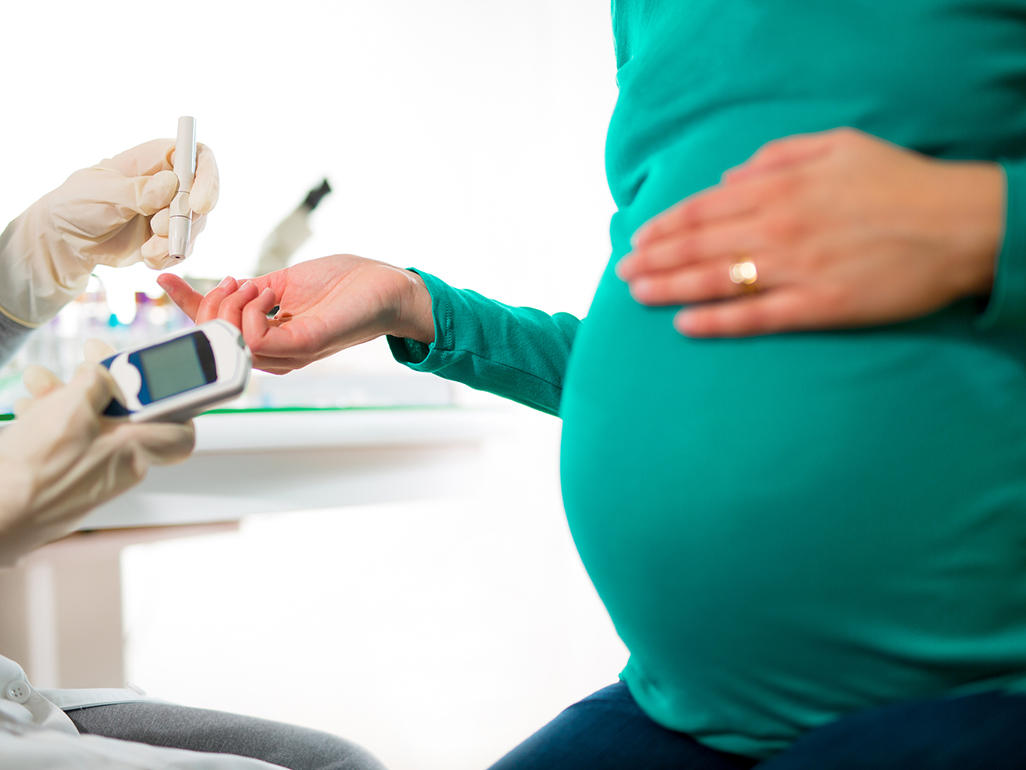Pregnancy is a beautiful phase of every women's life; with little precaution this journey can be memorable. Hellodox wishes happy nine months with expert advice on yoga, exercise, meal plans, natural care and home care. Get the best pregnancy care tips and charts on HelloDox.
Running is a huge part of my life. Most of my social life involves running. It's my preferred form of therapy. I almost always have a race on the horizon, and I get up early to log miles before work more often than not. In other words, I'm one of "those people" - the generally eccentric bunch of fitness nuts that make Colorado Springs a top running town.
When we found out I was pregnant with my first child in January, my husband and I were thrilled. After the initial excitement wore off, I began to think about the implications that held for my daily life, especially running. Every woman - and every pregnancy - is different, and my guess was as good as anybody else's on how my body would hold up through the nine months of creating a human. You hear about women having to stop exercise entirely, but there are also people running marathons with giant bellies.
It turns out, it really is an individual journey, and the best anyone can do is listen to her body and her doctor.
When I talked to my OB/GYN early on, she recommended modifying my pace by tracking my heart rate, keeping my exertion below 140 beats per minute. Through a bit of online research, I learned that the American College of Obstetricians and Gynecologists had removed the specific heart rate recommendation from their exercise guidelines several years ago. Instead, they encourage training by perceived exertion level: keeping all efforts to a pace where it's easy to carry on a conversation.
However, because my doctor was insistent on the heart rate monitoring, I decided to give it a try. I bought a chest strap monitor to pair with my GPS watch and learned just how little effort it took me to get up to 140 beats per minute. My 9- or 10-minute-mile pace ballooned to 11 or 12 minutes. Speed workouts were a no-go. For the rest of my pregnancy, I used 140 bpm as a guideline, but I wouldn't freak out if it spiked a little higher but I could still carry on a conversation.
During the first trimester, your body goes into overdrive, and your circulation system is producing extra blood to support your baby. I found that my heart rate would spike and I would get winded going up stairs, let alone running up a hill. My favorite running routes are on the trails through the mountains and hills surrounding Colorado Springs, so the 140 bpm limit seemed oppressive at first. My body wasn't much different externally, but I had to slow down a lot to keep my effort level moderate. It took me a little time to get my head around this new physical challenge I was "training" for.
Once I accepted my new parameters, though, I was able to stay fairly consistent, running four to five days a week at a slower pace. I was fortunate enough to avoid many of the discomforts of early pregnancy, such as consistent morning sickness. (I imagine a large chunk of people just stopped reading right there.) Trust me, I consider myself extremely lucky.
Maybe being fit to start out with helped, or maybe my body just handled this burden really well. As my belly began to expand in the second trimester, I noticed pain in my round ligaments, which run on either side of the belly, supporting the abdomen. I bought a support belt that I wore for a while, but I found that into the third trimester the pain decreased and the belt didn't make a whole lot of difference anymore, so I started leaving it behind.
As the third trimester wore on and the baby began exerting more internal pressure downward, I began requiring numerous midrun bathroom breaks on even the shortest of runs. I could draw a map from memory of the port-a-johns and favorable bushes in the local parks I was frequenting. I also noticed that the extra weight was taking a toll on my joints and muscles. I'd feel as tired after four miles as I used to be after eight. Another unfortunate side effect of carrying extra weight on the front of one's body is a lack of balance: I took a couple of spills and bloodied my knees pretty well, not expecting the tug of gravity to be so strong.
My biggest accomplishment was finishing a 10K race at 38 weeks. It wasn't pretty: I used every bathroom opportunity available and had to walk up the "hills" on the course. I joked with my friend Carrie, who ran with me, that she had to be ready to call 911, catch a baby or provide cover if I had to duck into the bushes - it was a big job!
I think all this activity will pay off: using endorphins to weather the emotional roller coaster of pregnancy hormones, being fit and healthy to undertake the marathon of labor and delivery and being able to bounce back faster afterward. As a bonus, I've already shared so much with my unborn child (about 700 miles' worth of experiences, if we are keeping score). My husband and I want to set the example of a healthy, active lifestyle right from the beginning. Plus, someone has to be able to keep up with this kid.
Since the 10K, I've slowed down quite a bit, but I still think about running all the time. I worry about what postpartum running will be like, both physically and from a time-management perspective. Right now I'm pretty eager to get back at it for many reasons (go ahead and Google "maternal fat stores"), but I know I'll need to temper that enthusiasm and follow my doctor's recommendations about when it's safe to start. I plan to ease back in, building mileage slowly (we've already bought a jogging stroller) and making sure to incorporate plenty of yoga, stretching, cross-training and strength training. I've learned through years of running what it takes for me to stay injury-free; I'll just have to be even more aware of what my body tells me as we all adjust to our new family member.
I feel lucky to have run as long as I did, but now I imagine what it will feel like to be able to run at a faster pace, to actually push myself. I picture the freedom of bombing down a rocky mountain trail, feeling the sun on my face and the wind in my hair.
And perhaps most of all, I dream of being able to cover more than 2 miles between bathroom stops.
Miles run (or hiked) while pregnant: Just over 700
Farthest distance: 13.1 miles at eight weeks along
Average weekly mileage: About 20 (until the last month, when it dropped to 10 or so)
According to a study, pregnancy in young women may increase the risk of stroke as compared to their older counterparts of childbearing age.
The findings showed that stroke risk was more in women aged 12 to 24 years and increased significantly by 60 per cent in women 25 to 34 years during pregnancy or post partum period up to six weeks after delivery. However, there was no difference in stroke risk in women who were 35 years or older.
"We have been warning older women that pregnancy may increase their risk of stroke, but this study shows that their stroke risk appears similar to women of the same age who are not pregnant," said lead author Eliza C. Miller from Columbia University Medical Centre (CUMC) in New York, US.
"But in women under 35, pregnancy significantly increased the risk of stroke. In fact, one in five strokes in women from that age group were related to pregnancy," Miller added.
Previous studies suggested that the risk of pregnancy-associated stroke is higher in older women than in younger women.
"The incidence of pregnancy-associated strokes is rising, and that could be explained by the fact that more women are delaying childbearing until they are older, when the overall risk of stroke is higher," noted Joshua Z. Willey, Assistant Professor at CUMC and neurologist at New York-Presbyterian Hospital in the US.
In the study, the team examined 19,146 women, aged 12 to 55 years. Of these, 797 (4.2 per cent) were pregnant or had just given birth.
They found that the overall incidence of stroke during or soon after pregnancy increased with age (46.9 per 100,000 in women age 45 to 55 vs 14 per 100,000 in women age 12 to 24).
However, pregnant and postpartum women in the youngest group (age 12 to 24) had more than double the risk of stroke than non-pregnant women in the same age group (14 per 100,000 in pregnant women vs 6.4 in non-pregnant women).
"We need more research to understand the causes of pregnancy-associated stroke better, so that we can identify young women at the highest risk and prevent these devastating events," Miller said.
The results appear in the journal JAMA Neurology.
Pregnant women with pregnancy-related diabetes are less likely to achieve blood sugar control if they rely on food stamps or have a generally chaotic lifestyle, according to a U.S. study.
These kinds of factors may be modifiable, the authors write in Obstetrics and Gynecology.
“Many social factors have a major impact on overall pregnancy health,” said Dr. Laura Colicchia, who led the study at the University of Pittsburgh and is currently in Maternal-Fetal Medicine at Abbott Northwestern Hospital in Minneapolis.
About 200,000 U.S. women develop diabetes during pregnancy each year, Colicchia said, and they must follow a strict diet, prick their fingers four times daily to check blood sugar, report their blood sugars to the doctor weekly, have frequent office visits and ultrasounds, and in many cases take insulin or medications several times daily to control their sugars.
“Gestational diabetes impacts every aspect of a woman's life including eating with and cooking for her family, scheduling her blood sugar checks and meals at work, where she obtains the food to follow the diet and how she creates time for everything,” she said.
“Because of this, barriers to management of diabetes can come from any part of her life including her family, her neighborhood, her daily routine or her employer,” she told Reuters Health by email.
Women who are obese, have limited access to food or are from marginalized communities are at higher risk for gestational diabetes and often have higher blood sugar levels when diabetes is diagnosed making it harder to control, Colicchia noted.
The researchers surveyed 111 women with gestational diabetes at clinical visits, using questionnaires designed to measure social support and degree of life “chaos,” which includes organization, stability and the ability to plan and prepare for the future.
They later analyzed medical records for blood sugar control and pregnancy outcomes, including infant size, maternal weight gain, cesarean delivery and newborn health.
Women were rated as having good blood sugar control if at least 70 percent of their blood sugar assessments were at goal level or better.
Overall, 86 of the 111 women achieved good glycemic control, either by diet changes alone or with the help of medication and insulin treatment. These women were more likely to be married, have higher household income and exercise three times a week, and less likely to have public insurance or a history of depression or anxiety.
In general, food access and social support were not related to blood sugar control, though women receiving Supplemental Nutrition Assistance Program (SNAP) benefits tended to have worse blood sugar control.
Women with poor blood sugar control had higher scores on the chaotic lifestyle scale than those with good control, the authors also found.
“Women are not always able to change many things that make life chaotic such as unstable housing, unpredictable work schedules, poverty and family stressors,” Colicchia said. “However, the gestational diabetes regimen in many cases can be adjusted to accommodate some of these factors, such as adjusting mealtimes or medication times to the woman's new schedule, or giving suggestions for healthy meals that can be eaten on the go or can be cooked ahead.”
Women who lack material resources and live amidst hubbub and chaos brought on by caring for children and working and the absence of a partner may have more trouble controlling their blood sugar, said Nancy Ross of McGill University in Montreal who was not involved in the study.
“It seems like these women need help to lessen the ‘hubbub and chaos’ - perhaps shorter working hours, some breaks from caring for children to focus on shopping and meal preparation and having time to exercise,” Ross said by email.
Doctors should ask women about the social factors relevant to diabetes care, and women should be honest with their doctors about the limitations they face, Colicchia said. ‘
“If doctors and nutritionists know in advance that a woman will not be able to eat breakfast because she has to get her kids on the bus, or that her employer won't let her check her sugar after lunch we can make suggestions and adjustments to accommodate some of these factors,” she said.
In a study that could lead to a new therapeutic approach to preventing premature birth, researchers have discovered the critical function of a type of mother's immune cells B lymphocytes in resisting pre-term birth triggered by inflammation.
These immune cells make antibodies to defend the body against infections, but scientists and clinicians have always thought these cells are rare or absent in the uterine lining and not important for pregnancy, according to lead researcher Kang Chen from Wayne State University in the US.
Chen's lab discovered that in late pregnancy, mothers' B lymphocytes not only reside in the uterine lining in both humans and mice, but also detect inflammation and uterine stress, which are major causes of pre-term birth.
These cells produce molecules including one called PIBF1 to suppress uterine inflammation and premature birth, said the study published in the journal Nature Medicine.
"This study not only reveals the long neglected function of B lymphocytes in promoting healthy pregnancy, but also supports therapeutic approaches of using B lymphocyte-derived molecules such as PIBF1 to prevent or treat pre-term birth," Chen said.
Chen's team performed proof-of-concept and efficacy studies in animal models and also filed a patent for this potential therapeutic approach.
Pre-term birth birth before 37 weeks of pregnancy is a major cause of infant death and long-term illnesses worldwide.
Remember the food you eat is the main source of nutrition for your baby and can help your baby’s growth and development. Hence, one of the best things that you can do for your baby is to eat a healthy diet during pregnancy. There are three nutrients that every pregnant woman must include in her diet on a daily basis. Here’s a break-up:
Protein
The amount of protein required by your body increases during pregnancy to help develop the baby and the placenta (the organ which connects the developing baby with the wall of the uterus). Protein also helps fight against nausea and the fatigue that pregnant women feel due to anemia. 90% of pregnant women in India suffer from protein deficiency. Check with your nutritionist about your protein intake or deficiency. If your diet is deficient in protein, ask your doctor for protein supplementation.
How much Protein do you need during pregnancy: Your individual protein requirement depends on your body weight. Generally, you need 0.5 g/day of additional protein intake in the first trimester.
Good food sources of protein: Seafood, lean meat, poultry, milk & milk products, eggs, beans, peas, soy products, unsalted nuts & seeds are known to be good sources of protein.
Iron
Iron can prevent anemia and infections; it can support your baby’s growth and brain development. Some women may find Iron-rich foods difficult to absorb. Here’s a helpful tip - add a Vitamin C-rich fruit with or just after your meal for better absorption of Iron. Avoiding tea 1 hour before and after having an iron-rich meal also helps the body to absorb this nutrient better.
How much Iron do you need: During the entire pregnancy period, an additional 760 mg of iron is needed.
Good food sources of iron: Lean meat, skinless chicken, fish, turkey and well cooked eggs. Vegetarian sources of iron include pulses, legumes, nuts, green leafy vegetables and cereals.
Calcium
Pregnant women need all the calcium they can get and it is important to understand why. Your baby’s bones are developed through the calcium in your blood. The baby’s heart, nerves and muscles depend on calcium for growth. If the calcium intake is not enough, even your bone health is at risk.While calcium is best obtained through food sources, a calcium supplement could help you in meeting nutrition needs during pregnancy. Sufficient vitamin D intake also helps in calcium absorption.
How much do you need: The recommended intake of calcium during pregnancy is 200 mg/day
Good food sources of calcium: Low fat dairy products like skimmed milk, low-fat cheese and yogurt. Fish with edible bones like sardines are high in calcium and so is tofu - a vegetable protein made from soybeans. Breakfast cereals, almonds, oranges, dried-fruits (e.g. apricots) and green leafy vegetables are good sources of calcium too.
Make sure you eat well, keep yourself hydrated and get adequate rest. Have a healthy & happy pregnancy.













